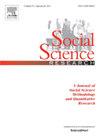志愿活动是否能减少老年人抗抑郁药的使用?来自丹麦的纵向登记证据
IF 3.5
2区 社会学
Q1 SOCIOLOGY
引用次数: 0
摘要
近年来,老年人使用抗抑郁药的人数激增。这是令人担忧的,因为抗抑郁药有严重的副作用,而且作为单独治疗时疗效有限。在这种背景下,有人声称志愿服务可以通过预防抑郁症状和提供管理抑郁症状的替代方法来减少抗抑郁药的使用。为了验证这一说法,我们将丹麦老龄化纵向研究与1995年至2018年的抗抑郁药处方登记数据合并在一起。利用这些数据,我们使用事件历史模型来估计志愿活动对抗抑郁药物使用的影响,该模型纠正了许多可能的混杂因素,包括先前使用抗抑郁药物的历史。我们的主要发现是,中等强度的志愿活动减少了老年人抗抑郁药的使用。在调整了心理健康状况不佳的症状后,这种影响仍然存在,而且与志愿者参加的组织类型无关。相比之下,我们发现低强度或高强度的志愿活动没有影响。本文章由计算机程序翻译,如有差异,请以英文原文为准。
Does volunteering reduce antidepressant use among older adults? Longitudinal register-based evidence from Denmark
Antidepressant use among older adults has surged in recent years. This is concerning since antidepressants have serious side effects and limited efficacy when used as a stand-alone treatment. Against this background, it has been claimed that volunteering may reduce antidepressant use, by preventing depressive symptoms and offering alternative ways to manage them. To test this claim, we merge the Danish Longitudinal Study of Aging with register data about redeemed antidepressant prescriptions from 1995 to 2018. Using this data, we estimate the effect of volunteering on antidepressant use with event-history models that correct for many possible confounders, including prior histories of antidepressant use. Our main finding is that moderate-intensity volunteering reduces antidepressant use among older adults. This effect persists when symptoms of poor mental health are adjusted for, and it does not depend on the type of organization volunteered for. By contrast, we find no effects of low- or high-intensity volunteering.
求助全文
通过发布文献求助,成功后即可免费获取论文全文。
去求助
来源期刊

Social Science Research
SOCIOLOGY-
CiteScore
4.30
自引率
4.00%
发文量
0
审稿时长
65 days
期刊介绍:
Social Science Research publishes papers devoted to quantitative social science research and methodology. The journal features articles that illustrate the use of quantitative methods in the empirical solution of substantive problems, and emphasizes those concerned with issues or methods that cut across traditional disciplinary lines. Special attention is given to methods that have been used by only one particular social science discipline, but that may have application to a broader range of areas.
 求助内容:
求助内容: 应助结果提醒方式:
应助结果提醒方式:


